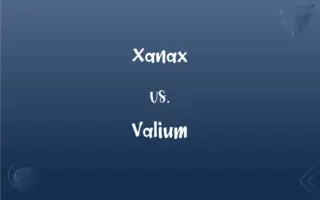Thunder vs. Lightning: What's the Difference?
Edited by Aimie Carlson || By Harlon Moss || Updated on June 1, 2024
Thunder is the sound produced by the rapid expansion of air along a lightning strike. Lightning is a visible electrical discharge between clouds or from cloud to ground, often causing thunder.

Key Differences
Thunder is a sound that originates from the rapid heating and expansion of air surrounding a lightning bolt. Lightning, on the other hand, represents the visible discharge of electrical energy. Both are intrinsic parts of a thunderstorm, but one appeals to our sense of hearing and the other to our sense of sight.
Thunder cannot exist without lightning, as it is the energy from the lightning that causes the air to heat and produce the thunderous sound. Lightning, however, can exist without thunder being perceived, especially when it occurs very far from a listener, showcasing that the physical phenomenon and our perception of it can be detached.
Thunder always follows lightning, due to the speed of light being much faster than the speed of sound. This means we see lightning before we hear the associated thunder. Lightning provides a direct and immediate visual of its occurrence, whereas thunder provides a delayed auditory experience.
Thunder varies in its auditory expression; it may rumble softly or crack loudly, depending on the distance and nature of the lightning. Conversely, lightning may appear as jagged bolts across the sky or simply illuminate clouds from within, showcasing variability in visual presentations.
Comparison Chart
Nature
Sound phenomenon
Electrical discharge
ADVERTISEMENT
Cause
Rapid expansion and contraction of air
Electrical charge buildup and discharge
Perception
Heard as a rumble or boom
Seen as a flash of light
Relationship
Result of lightning
Causes thunder
Speed
Travels at the speed of sound (343 m/s)
Travels at the speed of light (300,000 km/s)
Thunder and Lightning Definitions
Thunder
To move with a loud, rumbling noise.
The truck thundered down the dirt road.
ADVERTISEMENT
Lightning
Happening very quickly or unexpectedly.
Her decision came like a bolt of lightning.
Thunder
To hit something with force, causing a loud noise.
The basketball thundered against the backboard.
Lightning
Designed for or capable of fast motion.
The new car model has lightning speed.
Thunder
A loud, explosive, resounding noise.
The thunder was deafening during the storm.
Lightning
Intended to illuminate like a flash.
He turned on the lightning projector for the stage play.
Thunder
To loudly proclaim or declare.
He thundered his arrival with a boom of fireworks.
Lightning
A flash of light in the sky, occurring from atmospheric electrical discharge.
The lightning illuminated the night sky.
Thunder
To speak loudly or angrily.
She thundered her disapproval across the room.
Lightning
Applying a lightning effect.
The photographer used a lightning filter for dramatic effect.
Thunder
The crashing or booming sound produced by rapidly expanding air along the path of the electrical discharge of lightning.
Lightning
An abrupt, discontinuous natural electric discharge in the atmosphere.
Thunder
A sound that resembles or suggests thunder.
Lightning
The visible flash of light accompanying such a discharge.
Thunder
To produce thunder.
FAQs
What is thunder?
Thunder is the sound produced by the rapid expansion of air along a lightning strike.
Can thunder occur without lightning?
No, thunder is a direct result of lightning due to the rapid heating and expansion of air.
Can lightning be dangerous to people?
Yes, lightning can be extremely dangerous, causing fires and fatal electrical shocks.
What causes lightning?
Lightning is caused by the discharge of electrical energy during a thunderstorm, typically between clouds or from cloud to ground.
How can I protect myself during thunder and lightning?
Seek shelter indoors, avoid electrical appliances, stay away from windows, and avoid bathing during a thunderstorm.
Which is faster, thunder or lightning?
Lightning is seen almost instantly as light travels faster than sound, which makes thunder follow lightning.
Can we predict lightning and thunder?
Meteorologists use advanced technology to predict storms that might involve thunder and lightning.
How far away can lightning be seen?
Lightning can often be seen up to 100 miles away under the right conditions.
Is it true that lightning never strikes the same place twice?
No, it's a myth; lightning can and does strike the same place more than once.
Is there a specific season for thunder and lightning?
Thunderstorms are more common in spring and summer but can occur in any season.
Can lightning occur without thunder being heard?
Yes, if the lightning is far enough away, the sound of thunder may not reach the observer.
Is the phrase 'the calm before the storm' related to thunder or lightning?
It's related to both; typically, calm conditions precede a storm, which may bring both thunder and lightning.
Why do dogs often fear thunder?
Dogs may fear thunder due to its sudden, loud, and unpredictable nature, which can be anxiety-inducing.
Can thunder damage structures?
The shock waves from very close, powerful thunder can potentially cause minor damage.
Why does thunder sometimes sound like a rumble and sometimes like a crack?
Thunder sounds can be affected by distance, temperature, and obstacles that can distort the sound waves.
Why is thunder typically associated with being frightening?
The loud and unexpected nature of thunder, especially when close, can be startling or frightening to many.
Is it safe to drive during thunder and lightning?
It's generally safe if you stay inside the vehicle, as the metal frame can provide some protection from lightning.
Is lightning always followed by thunder?
Lightning is always followed by thunder, but it might not always be heard if it's too far away.
Can we have thunder and lightning in winter?
Yes, while less common, thundersnow (thunder and lightning during a snowstorm) can occur.
Can lightning have different colors?
Yes, the color of lightning can be influenced by the atmosphere and elements in the air.
About Author
Written by
Harlon MossHarlon is a seasoned quality moderator and accomplished content writer for Difference Wiki. An alumnus of the prestigious University of California, he earned his degree in Computer Science. Leveraging his academic background, Harlon brings a meticulous and informed perspective to his work, ensuring content accuracy and excellence.
Edited by
Aimie CarlsonAimie Carlson, holding a master's degree in English literature, is a fervent English language enthusiast. She lends her writing talents to Difference Wiki, a prominent website that specializes in comparisons, offering readers insightful analyses that both captivate and inform.






































































